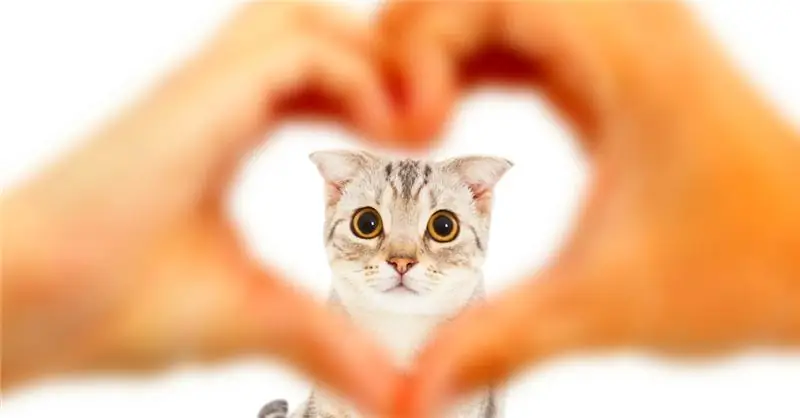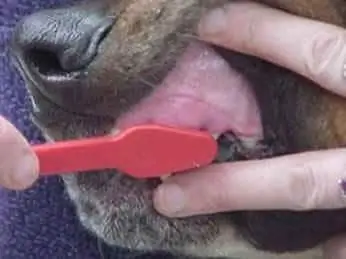
- Outeur Daisy Haig haig@petsoundness.com.
- Public 2023-12-17 03:04.
- Laas verander 2025-06-01 06:46.
So waarvoor is daardie verleentheids-caca-toets in elk geval?
Dit is stresvol om die agterkant van u troeteldier deur 'n plastiekstok te laat skend, of hoe? So, wat is die punt?
U sê: As die doel is om my troeteldier gesonder en parasietvry te maak, vertrou ek u oordeel, maar ek moet sê dat stoelgang 'n soort wrede en ongewone straf is. Ek kry nie die soort vernedering voordat ek manlik en veertig is nie, of hoe? En ontlasting is nie so nuttig nie, of hoe?
Ek sê: om mee te begin, hoef u nie u troeteldier te laat swig voor die skelmstok nie. 'N Vars monster kan gewoonlik die oggend (of middag) voor u jaarlikse besoek verkry word, of as u troeteldier simptome ly. Dit is regtig nie so moeilik nie. En as die tydsberekening nie presies reg is nie (ontlasting moet nie langer as 'n uur wees vir die beste resultate nie), sal u veearts hospitaal u beslis nie die reg ontken om 'n super vars monster in te bring op u gemak nie. Beloof.
En ja, fekale ondersoeke, hoewel relatief goedkoop en roetine, is onontbeerlik. Maar soos hierdie berig sal demonstreer, is dit ook waar dat nie alle fekale toetse 'n parasietinfeksie by u troeteldiere sal kry nie. Daarom kan jaarlikse en / of seriële fekale ondersoeke nodig wees.
Nou vir die primêre doel van die toets:
Veeartse is altyd op die uitkyk vir parasiete wat hul weg in die maag-dermkanale van u troeteldiere kan vind. Natuurlik kan ons mense ook parasiete kry, maar ons moderne lewenstyl is geneig om minder parasietinfeksies te bevorder. (Wanneer laas het jy in die tuin gesnuffel, lippe op die grond, net sodat jy 'n kat of twee katte kon inasem?)
Ja, troeteldiere kry baie parasiete. Hier is 'n voorbeeld van die mees algemene gastro-intestinale parasiete wat ek hier sien [in die parasiethemel wat semi-tropies is in Suid-Florida]:
Rondewurms by honde en katte.
Haakwurms by troeteldiere
Sweepwurms by troeteldiere
Giardia by troeteldiere

Lewerslak by troeteldiere
Lewerslak by troeteldiere
coccidia in pets
i’ll not go into the gory details on each but you can click on the links and check out the info for a better understanding of how these parasites can potentially affect your pets and even your human family.
sure, pet-popular parasites don’t often infect humans in the so-called, “developed” nations all of you reading this likely live in, but that doesn’t mean it doesn’t happen. roundworms and hookworms are still a factor in humans in the us, as is giardia, which will give you the nastiest case of diarrhea you can imagine short of amoebic dysentery.
since veterinarians are also on the front lines when it comes to public health, consider that fecal exams are not just necessary for healthy pets, they’re essential for healthy humans, too, more so if your family members are very young children, very old adults or otherwise immunocompromised (transplant patients, hiv-positive humans, chemo recipients, etc.).
how do we identify these critters in the fecal exam?
the short answer: with a microscope.
the long answer: we take a tiny sample of your pet’s stool (very fresh is always best). a few grams is enough (think an eighth of a teaspoon if that’s easier). then we put it through one of three processes.
1. the smear: we take about a half gram of stool and smear it onto a microscope slide to search for parasites (and bacteria) directly. many times we’ll see them swimming about. finding evidence of parasites in a simple smear is often indicative of severe infection.
2. the float: this method relies on mixing the stool with a special solution. it filters out the big pieces of stool in a tube or other cylindrical vessel and allows the eggs and other small critters to float up to the top, buoyed by the solution’s specific gravity. a microscope slide’s cover slip is typically used to recover the floaters. some parasites, however, aren’t amenable to flotation. eggs seem to do best through this method.
3. centrifugation: spinning the heck out of stool in a centrifuge when it’s mixed in a sugar solution picks up about 50% more parasite eggs and oocysts than through flotation. therefore, i like this method best for worm eggs, giardia, and coccidia--though i’d never go without a smear. problem is, most hospitals don’t yet use this method. it’s more expensive than others and research demonstrating it’s much greater efficacy is fairly recent.
so now you know the truth: not all fecal exams are created equal. not only does this test rely on careful selection of materials and methods, it also requires a trained eye. in our practice, for example, one of our techs detects parasites about 50% more often than the veterinarians and other techs/assistants. (that’s why we also do floats so that she can check them all at her convenience when she comes back from her day off.)
it’s also true that even a parasite-infected animal will often not come up positive on a fecal test. human error and equipment choice are factors, but so is the parasite itself. sometimes they do not make themselves known in the stool. worms sometimes aren’t shedding their eggs and subclinical (low-grade or smoldering) infections may not reveal much, either.
again, that’s why it’s important to perform this test as often as is reasonable. for all dogs and cats at least three times during the first few months of life. i want to see at least two negative tests in a row, a month apart, before i’ll feel comfortable that my patient is parasite-free.
for adults, once a year is great--that is, unless they show gastrointestinal illnesses. in this case, serial fecal tests make sense--or at least one every time the symptoms recur until a definitive diagnosis is made (whether it’s parasites or something else).
ultimately, fecal tests are a critical component of our veterinary hat of tricks. doing without may seem like the economically wisest thing in the absence of gastrointestinal symptoms, but consider: parasites can wear pets down in ways you might not expect. and it’s never wrong to be too safe in the presence of diseases that may also affect your family. ‘nuff said.
Aanbeveel:
Waarom Vra Veeartse Soveel As Hulle? - Waarvoor U By Die Veearts Betaal

Dit is 'n algemene vraag: "Waarom kos veeartsenykundige sorg so baie?" Die beste manier om plakkerskok te voorkom, is om voorbereid te wees, daarom het ons ons interne veearts gevra om te kyk wat betrokke is by 'n veeartsenykundige besoek en die tipiese koste wat u kan verwag. Lees meer
Wat Om Te Doen As Jou Troeteldier Jou Byt

Deur Laurie Hess, DVM, Dipl ABVP (Avian Practice) Oor die algemeen is die meeste nie-giftige slangspesies wat gewoonlik as troeteldiere aangehou word, sag en byt gewoonlik nie hul eienaars as hulle nie uitlok nie. Alle soorte kan egter onverwags byt as hulle skrik of buitensporig honger het. Uithongende reptiele kan uitsteek om knaagdiere te gryp en per ongeluk 'n menslike hand byt wat die prooi vashou. Slange kan ook meer geïrriteerd wees en meer geneig wees om te byt as hulle vergiet of 'n onderliggende siekte het en nie meer is nie
Is Diere In Staat Tot Liefde? Is Jou Troeteldier Lief Vir Jou?

Is my katte lief vir my? Ek glimlag al vra ek die vraag. Dit dink aan die aanhaling: "Honde het eienaars; katte het personeel." Maar honde is heeltemal 'n ander storie
N Geval Van Te Veel Tandheelkunde: Is Dit Moontlik Om Te Veel Na Die Tande Van U Troeteldier Te Kyk?

Ek sal meestal antwoord: NEE! Soos altyd, het ek egter 'n paar opwindende voorbeelde wat my eintlik twee keer laat dink oor hoeveel tandheelkundige sorg geskik is - en ek is 'n tandheelkundige junkie. Laat ek eers erken: ek glo net 'n klein minderheid honde kan gemaklik deur die lewe kom sonder roetine-tandheelkundige sorg. Studies toon aan dat selfs diegene wat nooit mondelinge ongemak kan ervaar langer, meer siektevry sal leef met roetine borsel en / of professionele skoonmaak nie
Hoe Om Te Weet Of U Troeteldier Nodig Is (en Wat Is Daar In Elk Geval 'n Lykskouing?)

Lykskouing, lykskouing van diere, troeteldiere, hond, kat
